-
 Bitcoin
Bitcoin $82,770.9885
-0.53% -
 Ethereum
Ethereum $1,811.0838
-0.62% -
 Tether USDt
Tether USDt $0.9996
-0.01% -
 XRP
XRP $2.0610
1.56% -
 BNB
BNB $591.5998
-0.12% -
 USDC
USDC $0.9999
0.00% -
 Solana
Solana $116.7637
-3.59% -
 Dogecoin
Dogecoin $0.1606
-2.58% -
 Cardano
Cardano $0.6491
0.00% -
 TRON
TRON $0.2375
1.32% -
 Toncoin
Toncoin $3.6204
-7.56% -
 UNUS SED LEO
UNUS SED LEO $9.4063
0.23% -
 Chainlink
Chainlink $12.8000
-2.19% -
 Stellar
Stellar $0.2605
1.01% -
 Avalanche
Avalanche $18.1124
-1.26% -
 Sui
Sui $2.2384
-2.51% -
 Shiba Inu
Shiba Inu $0.0...01223
0.65% -
 Hedera
Hedera $0.1627
0.30% -
 Polkadot
Polkadot $4.0538
1.44% -
 Litecoin
Litecoin $82.9722
0.02% -
 MANTRA
MANTRA $6.4051
3.36% -
 Bitcoin Cash
Bitcoin Cash $301.6530
1.88% -
 Bitget Token
Bitget Token $4.4826
-1.05% -
 Dai
Dai $1.0000
0.02% -
 Ethena USDe
Ethena USDe $0.9995
-0.02% -
 Monero
Monero $212.5474
-1.93% -
 Hyperliquid
Hyperliquid $11.6624
-5.49% -
 Pi
Pi $0.5680
-13.45% -
 Uniswap
Uniswap $5.8333
-1.59% -
 Aptos
Aptos $5.0533
-1.32%
What is the minimum budget for blockchain system development?
The budget for blockchain development ranges from $20,000 for basic systems to over $100,000 for complex ones, influenced by project complexity, tech stack, and team location.
Apr 01, 2025 at 09:00 pm
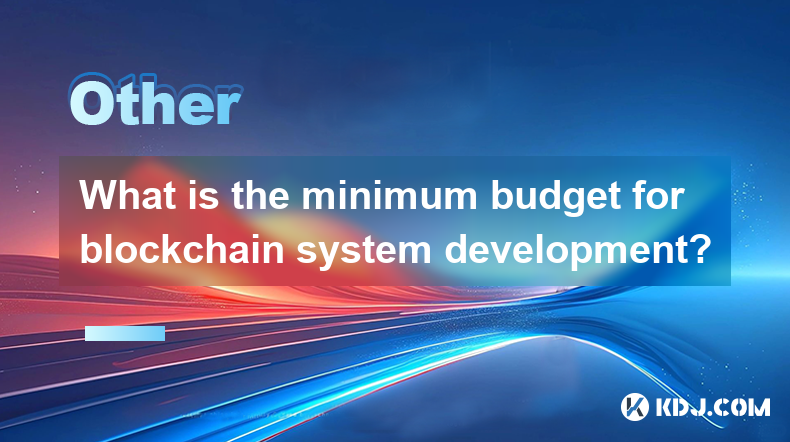
The minimum budget for blockchain system development can vary significantly based on several factors, including the complexity of the project, the technology stack used, and the geographical location of the development team. For a basic blockchain system, the budget might start from around $20,000 to $50,000. This range typically covers the development of a simple blockchain application with basic features such as a decentralized ledger and smart contract functionality. However, for more complex systems that require advanced features like scalability solutions, interoperability with other blockchains, or integration with existing systems, the budget can easily escalate to $100,000 or more.
Factors Influencing the Budget
Several factors can influence the budget for blockchain system development. The complexity of the project is a primary determinant. A simple blockchain application with basic features will naturally cost less than a more sophisticated system that requires advanced functionalities. The technology stack used also plays a crucial role. For instance, using established platforms like Ethereum or Hyperledger might be less costly than developing a blockchain from scratch. The geographical location of the development team can also impact costs, as rates for developers vary widely between regions. Teams in North America or Western Europe typically charge more than those in Eastern Europe or Asia.
Basic Blockchain System Development
For a basic blockchain system, the budget might range from $20,000 to $50,000. This budget typically covers:
- Project planning and analysis: Understanding the requirements and defining the scope of the project.
- Development of the blockchain network: Setting up the nodes and the decentralized ledger.
- Smart contract development: Creating basic smart contracts to automate transactions and enforce rules.
- Testing and deployment: Ensuring the system works as intended and deploying it to a live environment.
- Basic user interface: Developing a simple frontend for users to interact with the blockchain.
Advanced Blockchain System Development
For more advanced blockchain systems, the budget can start from $100,000 and go much higher. This budget might include:
- Scalability solutions: Implementing technologies like sharding or layer-2 solutions to handle higher transaction volumes.
- Interoperability: Developing mechanisms to allow the blockchain to interact with other blockchains or existing systems.
- Security enhancements: Adding advanced security features like multi-signature wallets or advanced encryption.
- Comprehensive user interface: Creating a more sophisticated frontend with advanced features and user experience enhancements.
- Ongoing maintenance and support: Ensuring the system remains operational and secure over time.
Technology Stack Considerations
The choice of technology stack can significantly impact the budget. Using established platforms like Ethereum or Hyperledger can reduce costs because these platforms offer pre-built components and a large community of developers. However, if the project requires a custom blockchain solution, the costs can increase due to the need for more extensive development and testing. Additionally, integrating with other technologies or existing systems can add to the budget, as it may require additional development and testing efforts.
Geographical Location of the Development Team
The geographical location of the development team is another critical factor. Developers in regions like North America or Western Europe typically charge higher rates than those in Eastern Europe or Asia. For example, a developer in the United States might charge $100 to $150 per hour, while a developer in Eastern Europe might charge $30 to $60 per hour. This difference can significantly impact the overall budget, especially for larger projects that require extensive development time.
Project Complexity and Scope
The complexity and scope of the project are perhaps the most significant factors affecting the budget. A simple blockchain application with basic features will be less costly than a more complex system that requires advanced functionalities. For instance, a basic decentralized ledger with simple smart contracts might be developed within the $20,000 to $50,000 range. However, if the project requires advanced features like scalability solutions, interoperability, or integration with existing systems, the budget can easily escalate to $100,000 or more.
Case Studies and Examples
To provide a clearer picture, let's look at some case studies and examples. A simple blockchain application for a small business might be developed for around $30,000. This budget would cover the development of a basic decentralized ledger and a few smart contracts to automate transactions. On the other hand, a more complex project like a decentralized finance (DeFi) platform might require a budget of $200,000 or more. This budget would include the development of advanced smart contracts, scalability solutions, and a comprehensive user interface.
Budget Breakdown
Breaking down the budget can help in understanding where the costs are coming from. For a basic blockchain system, the budget might be allocated as follows:
- Project planning and analysis: 10% to 15%
- Development of the blockchain network: 30% to 40%
- Smart contract development: 20% to 30%
- Testing and deployment: 10% to 20%
- Basic user interface: 10% to 15%
For an advanced blockchain system, the budget allocation might look like this:
- Project planning and analysis: 5% to 10%
- Development of the blockchain network: 20% to 30%
- Smart contract development: 15% to 25%
- Testing and deployment: 10% to 20%
- Scalability solutions: 10% to 15%
- Interoperability: 5% to 10%
- Security enhancements: 5% to 10%
- Comprehensive user interface: 10% to 15%
- Ongoing maintenance and support: 5% to 10%
Cost-Saving Strategies
There are several strategies that can be employed to save costs during blockchain system development. One approach is to use existing platforms like Ethereum or Hyperledger, which can reduce development time and costs. Another strategy is to outsource development to regions with lower labor costs, such as Eastern Europe or Asia. Additionally, prioritizing features and focusing on the most essential functionalities first can help manage the budget more effectively. Finally, regularly reviewing and adjusting the project scope can help keep costs under control.
Potential Risks and Challenges
Developing a blockchain system comes with its own set of risks and challenges. Technical complexity can lead to higher costs and longer development times. Security vulnerabilities are a significant concern, as any flaw in the system can be exploited by malicious actors. Regulatory compliance can also add to the costs, as ensuring that the blockchain system adheres to relevant laws and regulations may require additional development and legal efforts. Scalability issues can arise, especially for systems that need to handle high transaction volumes. Addressing these challenges requires careful planning and potentially additional budget allocations.
Future Trends and Considerations
Looking ahead, several trends and considerations can impact the budget for blockchain system development. Increased adoption of blockchain technology across various industries may lead to more standardized solutions and potentially lower costs. Advancements in technology, such as improved scalability solutions and more efficient consensus mechanisms, can also affect the budget. Regulatory changes can influence the development process and costs, as new regulations may require additional compliance measures. Finally, the growing ecosystem of blockchain developers can impact costs, as increased competition may lead to more competitive pricing.
Common Questions and Answers
Q: What is the minimum budget for developing a basic blockchain system?
A: The minimum budget for developing a basic blockchain system typically ranges from $20,000 to $50,000. This budget covers the development of a simple decentralized ledger and basic smart contracts.
Q: How does the complexity of the project affect the budget?
A: The complexity of the project significantly impacts the budget. A simple blockchain application with basic features will cost less than a more complex system that requires advanced functionalities like scalability solutions, interoperability, or integration with existing systems.
Q: Can using existing platforms like Ethereum or Hyperledger reduce costs?
A: Yes, using established platforms like Ethereum or Hyperledger can reduce costs because these platforms offer pre-built components and a large community of developers, which can shorten development time and lower expenses.
Q: How does the geographical location of the development team influence the budget?
A: The geographical location of the development team can significantly impact the budget. Developers in regions like North America or Western Europe typically charge higher rates than those in Eastern Europe or Asia, which can affect the overall cost of the project.
Q: What are some cost-saving strategies for blockchain system development?
A: Cost-saving strategies include using existing platforms, outsourcing development to regions with lower labor costs, prioritizing essential features, and regularly reviewing and adjusting the project scope to manage the budget effectively.
Q: What are the potential risks and challenges in blockchain system development?
A: Potential risks and challenges include technical complexity, security vulnerabilities, regulatory compliance, and scalability issues. Addressing these challenges may require additional budget allocations and careful planning.
Q: How might future trends affect the budget for blockchain system development?
A: Future trends such as increased adoption of blockchain technology, advancements in technology, regulatory changes, and the growing ecosystem of blockchain developers can all impact the budget. These trends may lead to more standardized solutions, lower costs, and more competitive pricing.
Disclaimer:info@kdj.com
The information provided is not trading advice. kdj.com does not assume any responsibility for any investments made based on the information provided in this article. Cryptocurrencies are highly volatile and it is highly recommended that you invest with caution after thorough research!
If you believe that the content used on this website infringes your copyright, please contact us immediately (info@kdj.com) and we will delete it promptly.
- Gold Exempt From New "Reciprocal" Tariffs
- 2025-04-04 06:35:12
- Time to Buy Aptos (APT) Cheap? This Chart Pattern Signals a 10% Move for the Price!
- 2025-04-04 06:35:12
- An Analyst Has Explained How Dogecoin Could Be at a Make-or-Break Level Right Now Based on a TA Chart Pattern
- 2025-04-04 06:30:12
- Micro Intelligence Company Strategy Has Purchased 22,048 Bitcoins Worth $1.92 Billion in a New Deal
- 2025-04-04 06:30:12
- BlockDAG's Beta Testnet Is Live— Aims to Achieve 15K TPS! Ethereum Price Falls 0.5% & ETC Dips 6.7%
- 2025-04-04 06:25:12
- title: New decentralized finance (DeFi) trading altcoin is surging after gaining support from the top US-based crypto exchange platform by volume
- 2025-04-04 06:25:12
Related knowledge

What are the future development trends of blockchain game development?
Apr 03,2025 at 05:00am
Blockchain technology has revolutionized various industries, and gaming is no exception. As we look to the future, several trends are set to shape the development of blockchain games. These trends not only promise to enhance the gaming experience but also to integrate blockchain technology more seamlessly into the gaming ecosystem. Let's explore these t...

What are the maintenance costs of blockchain system development?
Apr 03,2025 at 06:07pm
The maintenance costs of blockchain system development are multifaceted and depend on various factors. These costs can include technical maintenance, security updates, infrastructure expenses, and personnel costs. Understanding these elements is crucial for anyone planning to develop or maintain a blockchain system. Technical MaintenanceTechnical mainte...
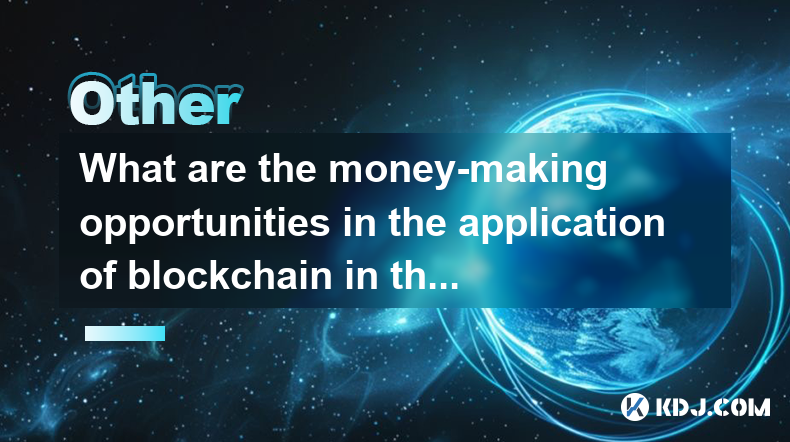
What are the money-making opportunities in the application of blockchain in the medical industry?
Apr 03,2025 at 03:35am
The integration of blockchain technology into the medical industry presents a myriad of money-making opportunities that can revolutionize healthcare systems. Blockchain's inherent characteristics, such as transparency, security, and immutability, make it an ideal solution for various medical applications. By leveraging blockchain, companies can develop ...
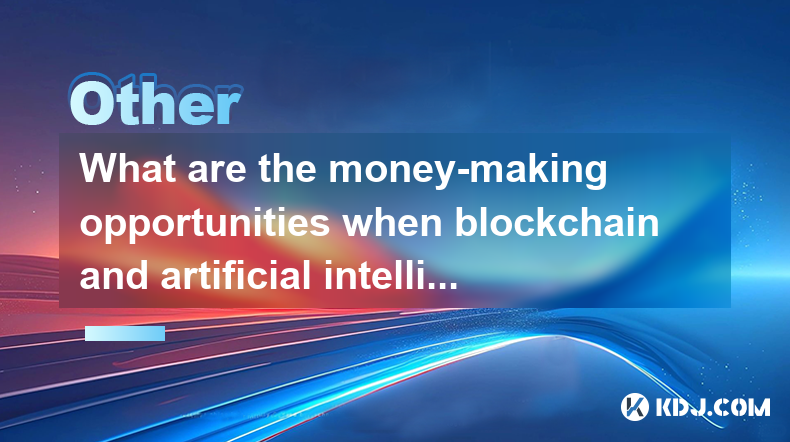
What are the money-making opportunities when blockchain and artificial intelligence are combined?
Apr 04,2025 at 01:28am
The convergence of blockchain and artificial intelligence (AI) presents a myriad of money-making opportunities within the cryptocurrency circle. This fusion leverages the decentralized and secure nature of blockchain with the analytical prowess of AI, creating innovative solutions and platforms that can generate significant revenue. From enhancing tradi...
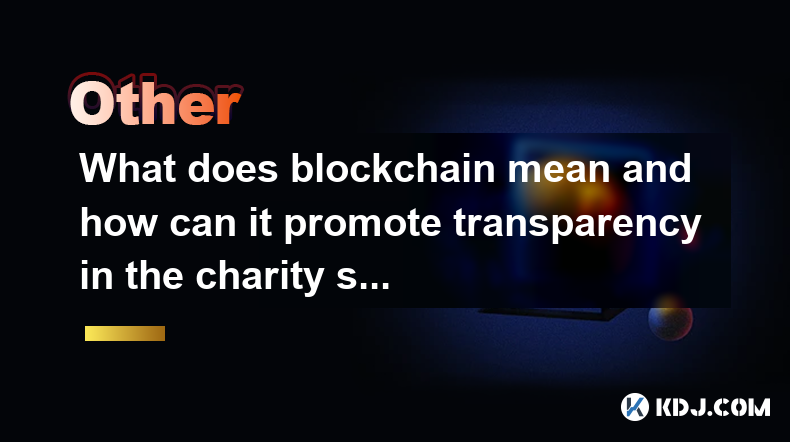
What does blockchain mean and how can it promote transparency in the charity sector?
Apr 03,2025 at 08:29pm
Blockchain technology is a decentralized, distributed ledger that records transactions across numerous computers. This ensures that the data is transparent and nearly impossible to alter retroactively. Essentially, blockchain serves as a digital ledger of all cryptocurrency transactions, enabling secure and direct exchanges without the need for intermed...
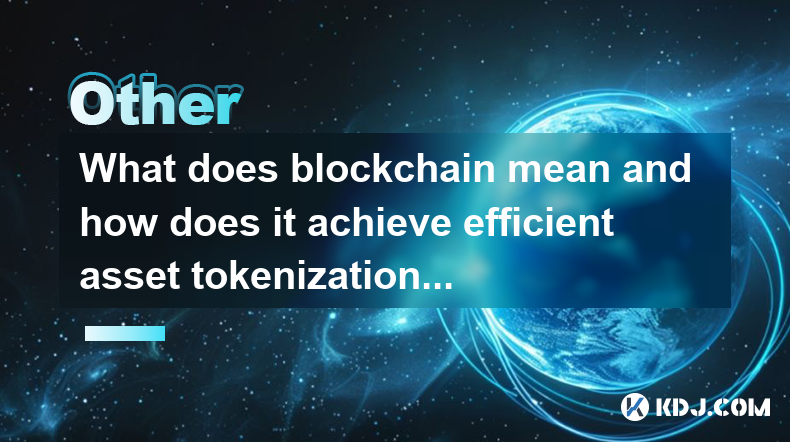
What does blockchain mean and how does it achieve efficient asset tokenization?
Apr 03,2025 at 07:57pm
Blockchain technology is a decentralized, distributed ledger that records transactions across numerous computers. It ensures that each transaction is secure, transparent, and immutable. The concept of blockchain was introduced with the launch of Bitcoin in 2009, but its applications have since expanded far beyond cryptocurrencies. At its core, blockchai...

What are the future development trends of blockchain game development?
Apr 03,2025 at 05:00am
Blockchain technology has revolutionized various industries, and gaming is no exception. As we look to the future, several trends are set to shape the development of blockchain games. These trends not only promise to enhance the gaming experience but also to integrate blockchain technology more seamlessly into the gaming ecosystem. Let's explore these t...

What are the maintenance costs of blockchain system development?
Apr 03,2025 at 06:07pm
The maintenance costs of blockchain system development are multifaceted and depend on various factors. These costs can include technical maintenance, security updates, infrastructure expenses, and personnel costs. Understanding these elements is crucial for anyone planning to develop or maintain a blockchain system. Technical MaintenanceTechnical mainte...

What are the money-making opportunities in the application of blockchain in the medical industry?
Apr 03,2025 at 03:35am
The integration of blockchain technology into the medical industry presents a myriad of money-making opportunities that can revolutionize healthcare systems. Blockchain's inherent characteristics, such as transparency, security, and immutability, make it an ideal solution for various medical applications. By leveraging blockchain, companies can develop ...

What are the money-making opportunities when blockchain and artificial intelligence are combined?
Apr 04,2025 at 01:28am
The convergence of blockchain and artificial intelligence (AI) presents a myriad of money-making opportunities within the cryptocurrency circle. This fusion leverages the decentralized and secure nature of blockchain with the analytical prowess of AI, creating innovative solutions and platforms that can generate significant revenue. From enhancing tradi...

What does blockchain mean and how can it promote transparency in the charity sector?
Apr 03,2025 at 08:29pm
Blockchain technology is a decentralized, distributed ledger that records transactions across numerous computers. This ensures that the data is transparent and nearly impossible to alter retroactively. Essentially, blockchain serves as a digital ledger of all cryptocurrency transactions, enabling secure and direct exchanges without the need for intermed...

What does blockchain mean and how does it achieve efficient asset tokenization?
Apr 03,2025 at 07:57pm
Blockchain technology is a decentralized, distributed ledger that records transactions across numerous computers. It ensures that each transaction is secure, transparent, and immutable. The concept of blockchain was introduced with the launch of Bitcoin in 2009, but its applications have since expanded far beyond cryptocurrencies. At its core, blockchai...
See all articles






















































































